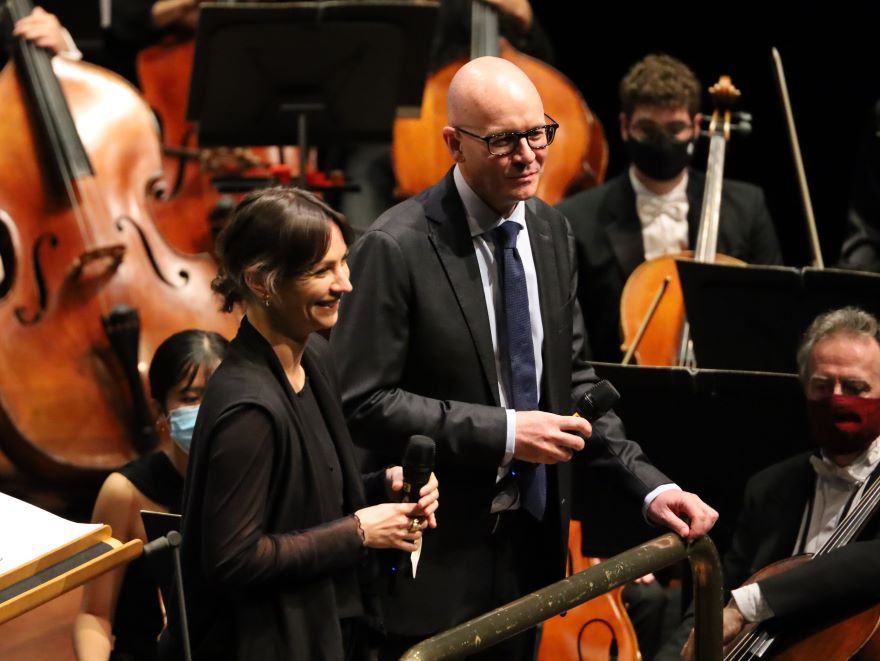In Become Ocean, WASO and WAYO offer two new works that tinker at the conceptual boundaries of Perth Festival’s theme “Wardan” (ocean), writes Claire Coleman.
Marine motions in music
7 March 2022
- Reading time • 6 minutesMusic
More like this
- Rewriting tradition with skill and charm
- Close encounter stirs the soul
- The great unknown
Become Ocean, WA Symphony Orchestra & WA Youth Orchestra ·
Perth Concert Hall, 5 March 2022 ·
In the dwindling days of this year’s Perth Festival, the West Australian Symphony Orchestra (WASO) once again team up with the Western Australian Youth Orchestra (WAYO) to present “Become Ocean”, a marine-ish program notionally responding to the Festival’s theme of “Wardan” (Noongar for “ocean”).
Expectations are high heading in, given the superb execution of last Festival’s WASO-WAYO collaboration “Dreams of Place”. Despite needing to bring in both Jen Winley and James Ledger to replace conductor Benjamin Northey who was unable to attend due to travel restrictions, the program for “Become Ocean” ticks a lot of boxes.
Tonight’s purpose-composed opener is In Waves, by WASO’s newly minted composer in residence Olivia Davies. Enthusiasm regarding her appointment is not misplaced; Davies work is articulate and evocative.
Davies explains in her introduction that the work uses the inspiration of a pendulum wave to explore her fascination with tone colour, stating that she both “did and didn’t” respond to the Festival’s theme.

A pendulum wave device creates a series of patterns by setting in motion a row of balls suspended at different heights. Sometimes the balls move neatly in standing or traveling waves, and we hear this in the entries, overlaps, and exits of different instruments. Other times the pattern is more random, with instruments falling into and out of sync with one another.
Davies’ promised tone play emerges in opening growls verging on ugly in the double bass, overlaid with the glassy ring of a singing bowl in the percussion. Later, performers fiddle with the norms of tone production, producing sirens and bird-calls, harmonics and breath-based passages. Pleasant dissonance in moments of collision give welcome structure.
Davies work is well received, and followed by another work from a composer captivated by tone colour: Benjamin Britten’s well-loved Four Sea Interludes from Peter Grimes. From the languorous string and woodwind phrases in “Dawn”, to the rare extended viola melody in “Sunday Morning” and into the harmonic reverie “Moonlight” establishes before the climactic closing, “Storm”, there is a feeling of expansion on stage, like the orchestra has been allowed to stretch its legs.
Conductor Jen Winley exerts just the right balance of control and latitude to ensure the massive crescendo at the end of the first movement reaches a vibrant fortissimo while remaining tasteful.
After interval, composer (but, tonight, conductor) James Ledger introduces the Australian premiere of John Luther Adams’ dauntingly minimalist Become Ocean. The work explores a single idea over 42 minutes, Ledger tells us, and we shouldn’t expect to leave whistling any catchy themes since there aren’t any.
Like the ocean, though, the work disguises an orderly systematic structure beneath a random visage. The orchestra is divided into three groups, distractingly lit in different colours at certain times, playing independent palindromic figures that coincide periodically. The palindrome also applies on a macro scale, as the entire work reaches a mid-point and then repeats in reverse, thus reading the same forwards and backwards.
While the palindromes are not especially audible, with an imaginative and freeform listening approach it is possible to find in-roads; two xylophonists working in opposition and then in tandem, the brief exposure of a lithe piano ostinato when other instruments drop out, the return to mesmerising wash after the discomfort of the whole orchestra landing together on a dissonant passage.
The evening’s program asks a lot of the audiences, not only in willingness to attempt these kinds of unorthodox listening approaches, but also in proposing a watery theme that isn’t always particularly apparent.
Nevertheless, Become Ocean rises to its various challenges, responding to instabilities in the national and international artistic landscape by leaning on hometown talent, building partnerships between student and professional musicians and engaging audiences in new works.
WASO’s next concert is ‘Asher Fisch Conducts Rite of Spring’ on 11 March 2022.
Find out more about the WA Youth Orchestra.
Pictured top: Jen Winley conducts the WA Symphony Orchestra and the WA Youth Orchestra. Photo supplied
Like what you're reading? Support Seesaw.






